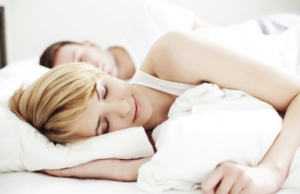 Unlike obstructive sleep apnea, which occurs due to blockage of the airways, central sleep apnea is a form of sleep apnea that occurs when the brain fails to send the proper signals to the muscles that regulate breathing. This type of sleep apnea is less common than obstructive sleep apnea and can occur in relation to other health conditions, such as stroke or heart failure. To better understand this condition, it’s important to first understand the factors that can put you at risk, including your health, sex, and prescription drug use. As your San Jose central sleep apnea specialists, Spark Sleep Solutions can help provide further information on central sleep apnea and associated risk factors.
Unlike obstructive sleep apnea, which occurs due to blockage of the airways, central sleep apnea is a form of sleep apnea that occurs when the brain fails to send the proper signals to the muscles that regulate breathing. This type of sleep apnea is less common than obstructive sleep apnea and can occur in relation to other health conditions, such as stroke or heart failure. To better understand this condition, it’s important to first understand the factors that can put you at risk, including your health, sex, and prescription drug use. As your San Jose central sleep apnea specialists, Spark Sleep Solutions can help provide further information on central sleep apnea and associated risk factors.
What are the Symptoms of Central Sleep Apnea?
Many symptoms of central sleep apnea are shared with those of obstructive sleep apnea, like snoring, difficulty falling and staying asleep and daytime fatigue. Central sleep apnea may also have you waking up abruptly and feeling short of breath, as well as experiencing nighttime chest pains. Because of the similar symptoms, it’s always best to leave it the professionals at your local central sleep apnea center to determine if you’re suffering from sleep apnea, and what kind you may have.
Are Men or Women at Higher Risk?
Though men and women alike can develop central sleep apnea, men are two to three times more likely to have sleep apnea than women. Women, however, may be more susceptible to some symptoms, as some studies show women report more difficulty both falling and remaining asleep, as well as higher levels of fatigue, even in more mild cases of sleep apnea. Despite these observations, it’s important to realize that central sleep apnea can be diagnosed whether you are male or female. Risk factors such as your overall health, weight, age, and medication use can all play a role in the development of central sleep apnea, so regardless of your gender, it’s crucial to understand your risk factors and take action to mitigate them where you can.
Treatment for Central Sleep Apnea
Despite being a more rare form of sleep apnea, there are still treatments available to help reduce the symptoms and effects of central sleep apnea. Treating any associated medical issues that can contribute to central sleep apnea, such as heart problems, can help reduce sleep apnea symptoms. A reduction or change in any prescription medications, such as opioids, can also improve symptoms.
There are also many other ways to treat central sleep apnea in the form of continuous positive airway pressure (CPAP) machines, adaptive servo-ventilation (ASV) machines, bilevel positive airway pressure (BPAP) machines, and supplemental oxygen. Your experts in sleep apnea solutions at Spark Sleep Solutions in San Jose, Santa Cruz, Los Gatos, and San Ramon can help decide if any of these treatments are right for you.
Talk to Your Specialists in Central Sleep Apnea in Santa Cruz Today
If you believe you may have sleep apnea, it’s important to speak to a doctor about it as soon as possible. When you’re in need of expert help with central sleep apnea, Spark Sleep Solutions is here to help. We specialize in the treatment of sleep apnea and snoring, allowing us to provide focused, detailed, and individualized treatment to each patient. The effects of sleep apnea can be devastating in your daily life, so why wait to treat it? Contact us today to schedule an appointment and let us help you finally get a good night’s sleep.
